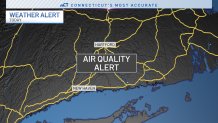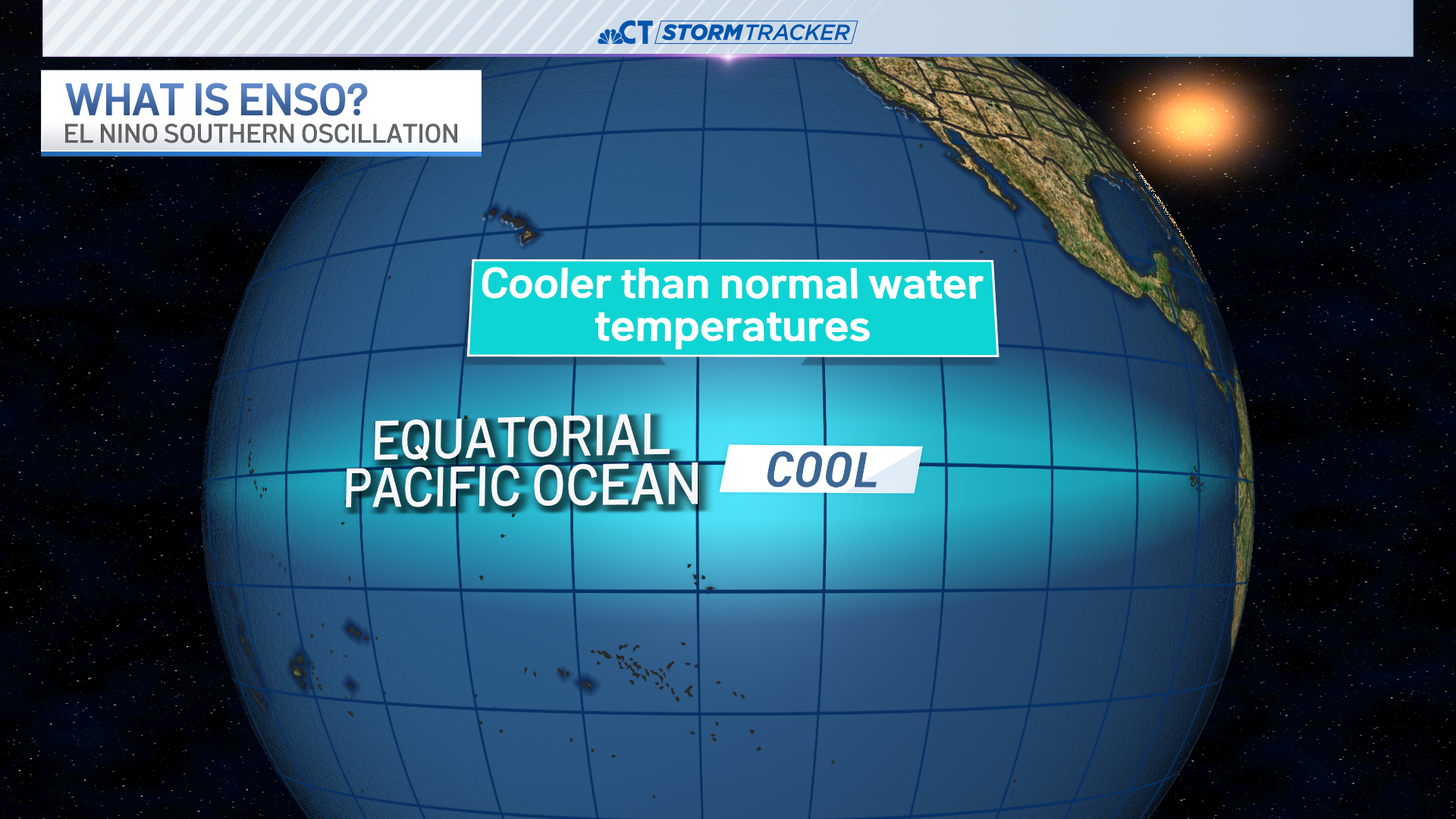The smoke from the Canadian wildfires continues to produce unhealthy air quality across the state and an air quality alert remains in effect for all of Connecticut through the day on Thursday.
Areas of smoke persist with unhealthy levels through the afternoon, but it is likely to improve later in the day, this evening and tonight.
“If you don’t need to be outside, particularly if you have respiratory issues or other similar ailments, it is strongly encouraged to stay indoors to the greatest extent possible until air quality improves,” Gov. Ned Lamont said in a statement.
Get Connecticut local news, weather forecasts and entertainment stories to your inbox. Sign up for NBC Connecticut newsletters.
The EPA said the primary concern is high concentrations of fine particle air pollution that is unhealthy, especially for sensitive groups such as people with respiratory disease, the elderly, or people with compromised health.
“Many areas in New England are currently experiencing unhealthy air quality levels due to smoke from wildfires in Canada. Scientists predict that the fire season in Canada will be longer and more intense as a result of climate change, so there is a chance we will see more of these kinds of events,” EPA New England Regional Administrator David Cash said in a statement.
He said we are seeing levels of air pollution that are unhealthy for all people, and especially for sensitive populations.
The EPA is encouraging people to check their Air Quality Index throughout the day to be aware of their local air quality and take steps to reduce smoke exposure and protect their health.
"Pay attention to any health symptoms if you have asthma, COPD, heart disease, or are pregnant. Get medical help if you need it,” the statement from Cash says.
The state Department of Public Health is recommending that people with asthma or heart and lung conditions avoid outdoor exercise Thursday.

“While we brace for another day of poor air quality, we continue to recommend that people avoid being outdoors for prolonged periods of time, if possible,” said Department of Public Health Commissioner Manisha Juthani said in a statement. “Those with underlying medical conditions, as well as children and older adults, are considered sensitive populations and are most at risk. KN95 and N95 masks are effective at filtering smoke; if you have one available, consider wearing one while outdoors until the air quality improves.”
“What we’re seeing this week is dramatic, unhealthy, and unprecedented,” said DEEP Commissioner Katie Dykes said in a statement. “Air pollution from Canadian wildfires, made worse by climate change, is now impacting the air we breathe for a fourth straight day. We recommend that people follow guidance from the Connecticut Department of Public Health to protect themselves from experiencing symptoms from elevated air pollution.”
It will be less smoky tomorrow.
A few showers are possible today, tonight, tomorrow and Saturday.
Sunday is the pick of the weekend with sun and clouds and 81.
On air quality maps, purple signifies the worst of the smoke.
In reality, it’s a thick, hazardous haze that’s disrupting daily life for millions of people across the U.S. and Canada, blotting out skylines and turning skies orange.
And with weather systems expected to hardly budge, the smoky blanket billowing from wildfires in Quebec and Nova Scotia and sending plumes of fine particulate matter as far away as North Carolina should persist into Thursday and possibly the weekend.
That means at least another day, or more, of a dystopian-style detour that's chased players from ballfields, actors from Broadway stages, delayed thousands of flights and sparked a resurgence in mask wearing and remote work — all while raising concerns about the health effects of prolonged exposure to such bad air.
The weather system that’s driving the great Canadian-American smoke out — a low-pressure system over Maine and Nova Scotia — “will probably be hanging around at least for the next few days,” U.S. National Weather Service meteorologist Bryan Ramsey said.
“Conditions are likely to remain unhealthy, at least until the wind direction changes or the fires get put out,” Ramsey said. “Since the fires are raging — they’re really large — they’re probably going to continue for weeks. But it’s really just going be all about the wind shift.”
Across the eastern U.S., officials warned residents to stay inside and limit or avoid outdoor activities again Thursday, extending “Code Red” air quality alerts in some places for a third-straight day as forecasts showed winds continuing to push smoke-filled air south.
Several Connecticut schools kept students inside Wednesday.
New York Gov. Kathy Hochul said the state was making a million N95 masks — the kind prevalent at the height of the COVID-19 pandemic — available at state facilities, including 400,000 in New York City. She also urged residents to stay put.
“You don’t need to go out and take a walk. You don’t need to push the baby in the stroller,” Hochul said Wednesday night. “This is not a safe time to do that.”
The message may be getting through. So far, officials said Wednesday, New York City has yet to see an uptick in 911 calls related to respiratory issues and cardiac arrests.
More than 400 blazes burning across Canada have left 20,000 people displaced. The U.S. has sent more than 600 firefighters and equipment to Canada. Other countries are also helping.
Canadian Prime Minister Justin Trudeau spoke to President Joe Biden by phone on Wednesday. Trudeau's office said he thanked Biden for his support and that both leaders “acknowledged the need to work together to address the devastating impacts of climate change.”
Canadian officials say this is shaping up to be the country's worst wildfire season ever. It started early on drier-than-usual ground and accelerated quickly. Smoke from the blazes has been lapping into the U.S. since last month but intensified with recent fires in Quebec, where about 100 were considered out of control Wednesday.
“I can taste the air,” Dr. Ken Strumpf said in a Facebook post from Syracuse, New York, where the sky took on the colorful nickname of the local university: Orange.
The smoke was so thick in Canada’s capital, Ottawa, that office towers just across the Ottawa River were barely visible. In Toronto, Yili Ma said her hiking group canceled a planned hike this week, and she was forgoing the restaurant patios that are a beloved summer tradition in a nation known for hard winters.
“I put my mask away for over a year, and now I’m putting on my mask since yesterday," Ma lamented.
Eastern Quebec got some rain Wednesday, but Montreal-based Environment Canada meteorologist Simon Legault said no significant rain is expected for days in the remote areas of central Quebec where the wildfires are more intense.
In the U.S., federal officials paused some flights bound Wednesday for New York's LaGuardia Airport and slowed planes to Newark and Philadelphia because smoke was limiting visibility.
Major League Baseball’s Yankees and Phillies had their games postponed. On Broadway, “Hamilton” and “Camelot” canceled Wednesday performances and “Prima Facie” star Jodie Comer left a matinee after 10 minutes because of difficulty breathing. The show restarted with an understudy, show publicists said.
It was not to be at Central Park's outdoor stage, either. Shakespeare in the Park canceled its Thursday and Friday performances of “Hamlet,” saying ’tis not nobler in the mind to suffer the slings and arrows of wretched air.


